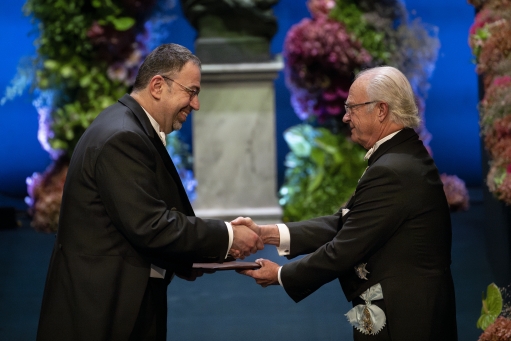Institute Professor Daron Acemoglu was presented with the 2024 Nobel Memorial Prize in Economics, alongside his longtime collaborators Simon Johnson PhD ’89 of MIT Sloan and James Robinson of the University of Chicago, at a ceremony in Stockholm on December 10. The awards presentation took place during the annual Nobel Week, which also includes lectures, a concert, and a banquet.
At the ceremony, Professor Jan Teorell of the Nobel Prize Committee highlighted the relevance of Acemoglu and this collaborators' insights for the case of 20th-century Sweden—when a conservative Swedish parliament quelled the threat of revolution by heeding its citizens’ demand for equal suffrage—and today, noting, “The large and persistent income gap between the world’s richest and poorest countries has enormous consequences for billions of people living in the world today. And your work proves that supporting democracy and inclusive institutions is an important way forward for reducing this gap.”
Acemoglu and his colleagues’ prize-winning work analyzes historical data to demonstrate that governments that uphold the rule of law, extend individual rights, and provide public infrastructure experience greater economic growth than those where power is wielded by a small elite. By studying the factors that shape historical transitions of government, they have also created a framework for understanding how institutions are formed and change.
Acemoglu delved into this work in his prize lecture, "Institutions, Technology, and Prosperity," also delivered in Stockholm this week. He described how he, Johnson, and Robinson approached their research before applying its framework to relevant questions of today, particularly the development and application of artificial intelligence. As Acemoglu remarked, "There are choices that are political, as well as technical, about how we develop AI and how we use it, which are going to be critical not just for the distribution of resources but also... the evolution of institutions."
